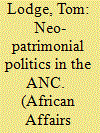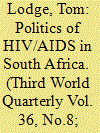| Srl | Item |
| 1 |
ID:
131809


|
|
|
|
|
| Publication |
2014.
|
| Summary/Abstract |
Following Jacob Zuma's ascension to the presidency in South Africa, the African National Congress (ANC) has been dogged by rumours of escalating corruption and the personalization of power. This article documents these trends and explores three ways of understanding neo-patrimonialism in South Africa's ruling party. First, the article addresses the possibility that such political habits have a long history within the ANC but were restricted during its years in exile and have begun to resurface now that the armed struggle is over. Second, it considers explanations that relate to the party's historical ties to criminal networks and pressures arising from the transition to majority rule and contemporary electoral politics. Finally, the article investigates whether neo-patrimonialism is a reflection of broader tendencies within South African political and economic life. All three factors are found to have played a role in the rise of neo-patrimonial politics, and it is the confluence of these trends that explains why these dynamics have taken such a strong hold on the party.
|
|
|
|
|
|
|
|
|
|
|
|
|
|
|
|
| 2 |
ID:
050634


|
|
|
|
|
| Publication |
Cape Town, New Africa Books, 2002.
|
| Description |
vi, 314p.
|
| Standard Number |
0864865058
|
|
|
|
|
|
|
|
|
|
|
|
Copies: C:1/I:0,R:0,Q:0
Circulation
| Accession# | Call# | Current Location | Status | Policy | Location |
| 047774 | 320.9680949/LOD 047774 | Main | On Shelf | General | |
|
|
|
|
| 3 |
ID:
140970


|
|
|
|
|
| Summary/Abstract |
A decade ago it seemed likely that African governments would be destabilised by the impact of the HIV/AIDS epidemic. This article tests some of the presumptions in such forecasting with an examination of the South African case. It begins with an assessment of the effects on the public health system of the South African government’s efforts to cope with the illness. Efforts to implement universal treatment of people who are HIV-positive appear to have strengthened government, while the costs have been affordable. The efforts have extended the embrace of the public health system and prompted the engagement of civil society in policy formation and implementation. Survey evidence suggests that the government has gained public approval and that its health service delivery has become more socially accountable. Civil protest to engender political reforms in the treatment of AIDS patients has enhanced the role of constitutional checks on executive authority.
|
|
|
|
|
|
|
|
|
|
|
|
|
|
|
|